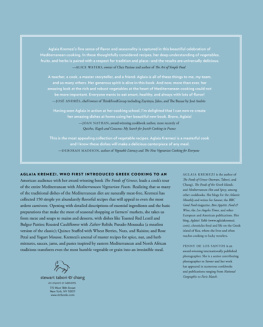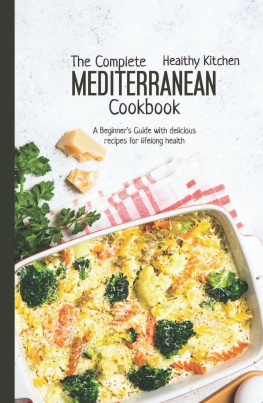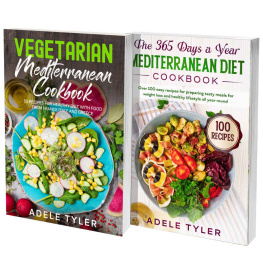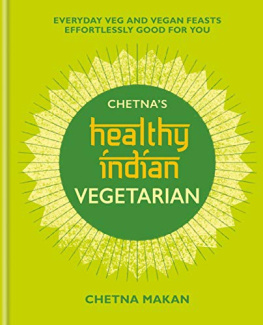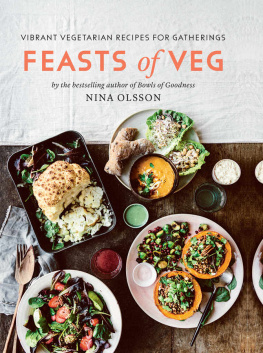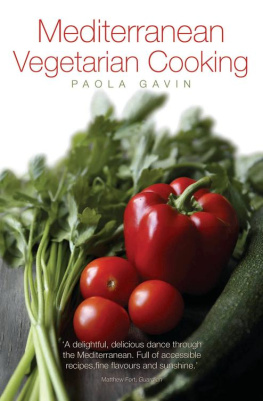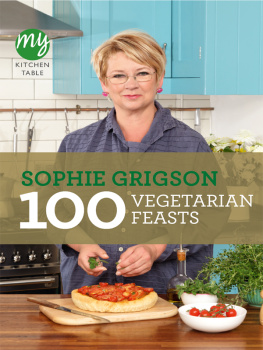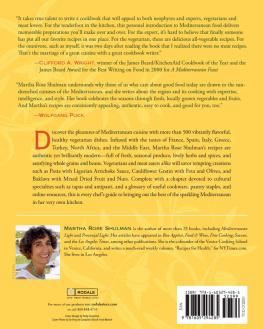


In loving memory of my mother,
FROSSOULA KREMEZI,
who taught me how to cook and organize my kitchen and my home.
and
To the Mediterranean women who bring love and joy to the table, the two secret ingredients that elevate even the humblest meal to an amazing feast!

CONTENTS

Late spring vegetables and greens from our garden.
FOREWORD
Although I dont consider myself a vegetarian, for as long as I can remember I have predominantly cooked and eaten vegetables and greens. Like Molires bourgeois gentilhomme, who exclaims, I have been speaking prose without knowing it for more than forty years, I recently realized that I have been mostly vegetarian, without knowing it, all my life!
This early-fall morning I grilled the sweet red peppers that Costas, my husband, brought from the garden. As I was dressing their charred skins and tender, full-bodied flesh with olive oil, vinegar, crushed coriander seeds, and a little garlicquite a simple preparationit occurred to me that these intensely flavored heirloom peppers illustrate the deep, multilayered story of mostly vegetarian Mediterranean cooking. Like tomatoes, the small, fiery-hot peppers from America were gradually incorporated into the Mediterranean kitchen. Stubborn peasant cooking does not change or move forward easilyit does not know the word fusionbut it does evolve. The strong attachment to tradition, with small openings for change and incorporation of new ingredients and techniques, is the lifeblood of our cuisine. Siga siga, we say often in Greece: Slowly slowly. But, in time, we embrace products and techniques from faraway places. The dialogue between old and new shows how Mediterranean cooks reflect deeply upon, and constantly improve, their traditional plant-based diet.
Tomato pastethe Mediterranean equivalent of soy sauceis such an indispensable year-round flavoring that it is easy to forget its modern Italian origins in the mid-nineteenth century. Can you imagine a Mediterranean cuisine without tomatoes? I think not. Both peppers and tomatoes earned their places in the Mediterranean pantheon of cooking because they so perfectly complement the flavor of olive oil and the Mediterranean summer crops. Other ingredientssuch as tofuhave failed to gain traction in our kitchens because they simply dont mesh with the basic principles of Mediterranean cooking explored in this book.
Going through thousands of my photos the other dayold Kodachromes and digital photos alikeI could barely find any meat dishes to include in a slideshow. Vegetables are more photogenic, colorful, and sexy, so obviously they were the Lolitas of the camera lens. And yet, if I had prepared meat more often over the years, I would certainly have more than a few decent pictures to show for it.
My cooking, I realized, is mostly vegetarian and often vegan, with the occasional use of fish or small amounts of meat as flavoring. Though I have embraced spices and flavorings from my travels throughout the world, my approach to cooking remains much in the tradition of my mother and grandmother. There is a big difference, though, between my kitchen and theirs: Widespread, quotidian consumption of meat is a relatively new phenomenon in this part of the world. I have options previous generations did not have. I could eat meat every day if I chose to, like most people I know. But I choose not to. Frankly, I find vegetable cooking and eating so much more exciting and wonderfully delicious. In this sense I remain with my feet firmly grounded in the traditions of the past, but with a constant eye on the trends of the present and the future. Slowly and carefully, I choose what new elements to bring into my repertoire. Some of the dishes I cook would be heretical in my mothers eyes. But I firmly believe that tradition must evolve in order to remain true to itself. This book adheres to the old ways and incorporates the benefits of the new. Is that not the essence of a healthy, living tradition?
COOK CREATIVELY: A METHODOLOGY OF MEDITERRANEAN COOKING
This book is designed to make you a better chef and a smarter shopper. It will help you to choose the best of the most tempting seasonal produce in your local markets. But there are a few simple, essential steps you must take to get the most out of the recipes that follow and to save yourself hours of daily preparation. A small investment of your time now will reap huge rewards every time you cook.
) to see what you should have at all times.
IN YOUR PANTRY: olive oil, flour, rice or bulgur, tomato paste, tahini, garlic, onions.
IN THE REFRIGERATOR: lemons, cheese, yogurt.
See also what I suggest you have IN THE FREEZER (precooked chickpeas, beans, and other legumes and grains) and plan and shop accordingly.
Go to the farmers market without preconceived ideas. Ask yourself: What are the freshest vegetables at the market today? Then buy them. Every day the answer will be different, and your ingredients will be at your mercy, not vice versa.
Choose plentifully so that you can make a few different dishes for the weeks meals.
Shop when you will have extra time upon returning home. Once home, dont just stuff everything in the fridge. This is the first step toward spoiling your excellent purchases.
) to see how you can store, prepare, and organize your produce. Then look up recipes and plan the stages that will help you cook easy yet fabulous dishes to showcase the seasons best vegetables!
).

), from our herb garden.
INTRODUCTION
I grew up eating mostly vegetarian food. In the mountainous, rocky Greek countryside, it is not possible to pasture large herds of animals, so a steady supply of meat was never certain. Until the 1960s, when commercial meat distribution started to touch all corners of the country, Greeks (like most southern Europeans) were mainly, if somewhat unwillingly, vegetarians by necessity. Since ancient times meat was a rare and expensive commodity consumed on Sundays, at Easter, at Christmas, and during important family feasts. Our traditional, well-balanced diet is based on garden vegetables and leafy greens called horta, which are either foraged from the hills and fields or cultivated. Garden vegetables, along with greens, are the basic components for countless diverse dishes served every day at Mediterranean tables. Beans of all kindschickpeas, lentils, dried fava beans, split peas, and black-eyed peasas well as nuts and grains, mainly in the form of bread, are our dry staples. They are complemented by and enriched with good, fruity olive oil, olives, capers, local cheeses, yogurt, and occasionally fresh or cured fish, especially anchovies and fresh or salted sardinesthe delicious fare of poor fishermen.
A Rich, Frugal, Vegetarian Legacy
Next page
